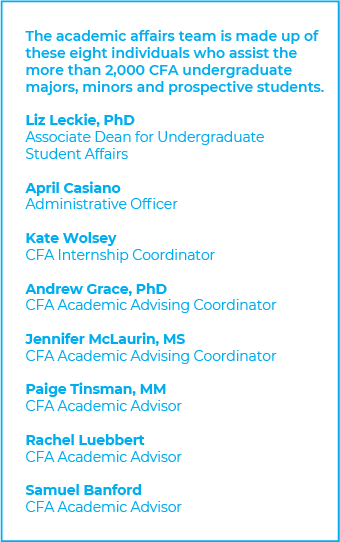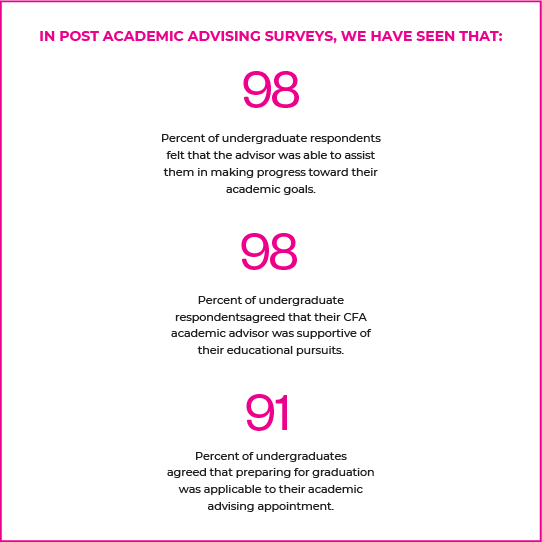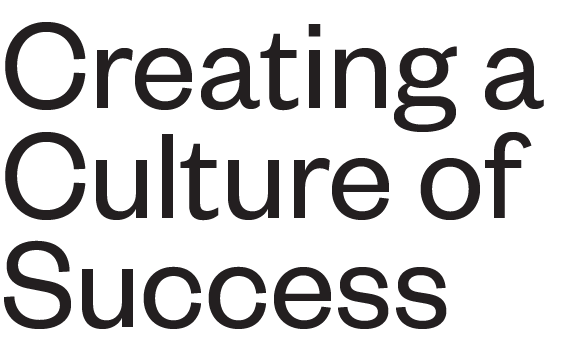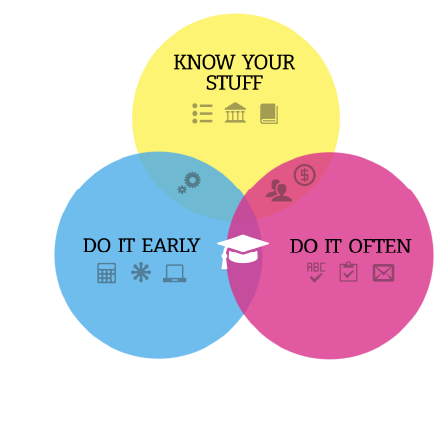WRITTEN BY MARINA GOMBERG
While perhaps a lesser-discussed pairing, art and data are really two sides of the same coin, two different but often intertwined ways of communicating reality. They can each inform the other, and together they help us interpret our world around us.
In the world of academic advising and assisting students as they navigate the complex and evolving processes to reach their graduations, the University of Utah College of Fine Arts has been diving deep into the data around what makes students successful.
The information exists in abundance in this era of Big Data, where almost everything a student does is tracked and logged. And our academic advising team, led by Associate Dean for Undergraduate Student Affairs, Liz Leckie, has illuminated the trends that help or can hinder our students as they navigate their undergraduate degrees. The data comes from institutional resources like the university’s Student Data Warehouse and national resources like the Strategic National Arts Alumni Project (SNAAP), as well as speaking with successful alumni about what helped them. It has identified the most common barriers to academic success for our students, the most impactful practices among academically successful students, and post-graduation pathways to success.
Together, it’s a magical formula.
“We have a lot of individual student interaction and understanding the context of what’s happening for students was hard for us to get,” Leckie said. “By utilizing additional data, we allow advisors to understand that student’s particular situation in a larger context — and that is how Create Success was born.”
Create Success is an innovative, data-driven initiative that identifies the common barriers to academic success and most impactful practices among academically successful students. The outward facing component is a thoughtfully curated and constructed website that lives at createsuccess.utah.edu. It provides information in three general sections: “Know Your Stuff,” “Do it Early,” and “Do it Often,” and is available not just for students but their families and support systems as well.
In addition to the website as an information and resource hub, the initiative includes work done behind the scenes to address some of the institutional processes that might create snags or hurdles for students. It also employs six Create Success Interns, led by CFA Academic Advising Coordinator, Jennifer McLaurin, who act as a bridge between their peers and the institution.
“As Create Success interns, we act as a form of communication between the CFA Advising team and the students,” said student Lia Wong. “We are there to explain things to the Advising Team from a student perspective, and we are also able to bring up any concerns or things that we think may be helpful in promoting success within the college. I think this is a very valuable aspect to have within a college because then everyone can be heard and all sections of the college can work together to help CFA students be successful.”
Their impact is multidirectional in that, in addition to helping the advisors understand the student experience, they make the college’s and university’s resources and processes more easily navigable to students.
“For instance, we have made many videos helping incoming students log onto their Campus Information Services (CIS) portal, introduce the academic advising team, learn how to complete a degree audit, and much more,” Connor Brown, another intern, said. “By making helpful videos, emails, and reaching out to the students, I feel that the intern’s student perspective and involvement in the Create Success program helps undergraduate students to be more successful.”
Since the program’s launch about five years ago, the college has seen a steady increase in academic advising appointments, satisfaction with their advising experiences, and the college’s number of graduates.
“It’s hard to say if the relationship is causal,” Leckie said. “But what I think we know is that we are making important strides in creating a culture of student success.” ■














